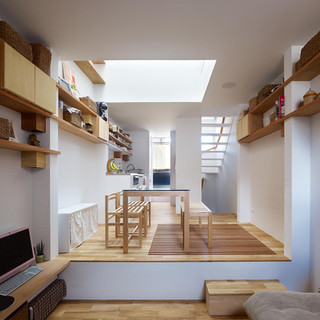A cup of tea with... FujiwaraMuro Architects
- Aug 15, 2021
- 3 min read
Updated: Jan 12, 2022

We're pleased to have with us Shintarou Fujiwara (right) and Yoshio Muro (left), founders of the FujiwaraMuro Architects studio, a reality born in 2002 that was able to respond, in our opinion, in a timely and precise manner to the requests of the residential building panorama of contemporary Japan.
Without frills and ready to listen to the needs of the client, with their projects they've introduced the theme of minimal spaces, dealing with lots with reduced shapes, in which natural light, despite everything, always reigns supreme, giving the spaces a warmth typical of the homes fully experienced by its inhabitants. The theme of pet architecture, brought to the fore by the renowned Atelier Bow-Wow studio, is easily found in large urban areas, where very small spaces with difficult volumetric development creep between existing buildings, sometimes even retrograde from the street and accessible only by a narrow passage.
You can also admire two projects by the FujiwaraMuro studio we're very close to - House in Goido and House in Muko - in our Japanese Contemporary House. These two works respond to the morphological needs of the site, the first proposes inside the house "the conditions of mobility and dynamism that occur outside the city", thus creating "a symbiosis of continuous flows between the various internal spaces and between interior and exterior "(taken from Japanese Contemporary House) so dear to the designers, while the second, thanks to its particular structure, allows natural light to penetrate inside the house in a predominant way without violating the privacy of its inhabitants .
Let's start with the first question to break the ice: How do you get your tea?
Muro. I prefer coffee rather than tea. I mill and drink coffee every morning.
I buy coffee bean at a small coffee shop nearby my house and sometimes at a shop I find during the day.
Fujiwara. I like to drink Japanese green tea. My wife get green tea at a shop nearby our house.
To this day, what do you think is your most significant and representative work of your design approach? Is there a project that you consider emblematic to tell who are you?
The basement of our firm is knowledge and methods for small and narrow spaces.
Tiny house in Kobe is one of the representative work for them.
These knowledges and methods have enabled us to deal with very difficult sites and conditions.
Now we're developing these knowledge and methods for bigger sites and projects to
propose various plans.

What do you think is a decisive project (of others) for your professional career? Who do you consider your teacher or an important reference for your work?
We can not choose a particular work or people who give us a decisive influence because we
are influenced by a lot of work and people. However, if we dare to choose, we think Yoshio Taniguchi is one of the bigarchitects who give us a big influence.
What will be the direction for the future of Japanese home architecture? Climate change, the aging of the population, the evolution of our daily habits due to the pandemic, which changes can affect the living spaces of tomorrow and how?
I feel the pandemic has given people a chance to rethink their home. I think that there will be an increasing demand forhomes that are not only functional but also for a better life. In addition, since public spaces that are "outside" have beenno longer safe spaces, I think there will be an increasing demand for incorporating "safe outside" and "safe publicspaces" into buildings. I think that it will be realized in the form of a courtyard, a dirt floor, a roof garden, etc., and willappear in a form that we have not yet imagined.
FujiwaraMuro Architects
Shintarou Fujiwara 1974 (Osaka, Japan)
1997 Graduated from KINDAI University, Faculty of Engineering,Department of Architecture - 1999 Degree of M.Eng. At KINDAI University, Graduate School of Science and Enginnering Research;
Yoshio Muro 1974(Nagoya, Japan)
1999 Graduated from KINDAI University, Faculty of Engineering, Department of Architecture.
2002 start FujiwaraMuro Architects
add: Osaka/Tokyo: 543-0012 大阪市天王寺区空堀町7-4
102 -0093 東京都千代田区平河町 1-3-6-2F mail: fma.staff@aplan.jp URL: http://www.aplan.jp/










Comments